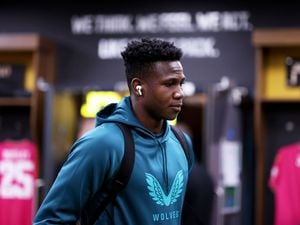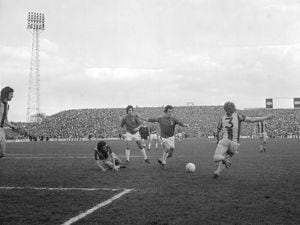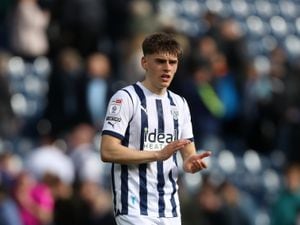England's Rachel Unitt has seen so much progress
Rachel Unitt’s first competitive experience as a young footballer was to play for Birchills Ramblers in a league which featured only three different teams.
Last night she was planning to be at a packed Old Trafford to see England’s ladies kick off their European Championship campaign against Austria.
Setting the scene for three-and-a-half weeks of competition on home soil which could properly capture the imagination if the Lionesses make progress.
A tangible sign of the considerable progress of women’s football over the last three decades, impressive strides forward which dovetailed with Unitt’s equally impressive career.
And it all began at Wolves!
Unitt, now 40, is one of the select band of England internationals to have chalked up a century of senior caps for her country, whilst she was also part of the squad for five major tournaments.
Fair to say she will know exactly how the camp has been feeling heading into a tournament in which England start as one of the genuine favourites to go all the way.
“It is such a great time and a great experience and that includes the whole build-up to the tournament with the excitement growing,” says Unitt.
“You have the warm-up games and then all of a sudden you are inside the camp and that is it – it’s all starting!
“Driving around you see all the billboards and the posters with players’ faces on and everything is about England.
“It feels like that aspect and the profile of it all is getting close to what you see around the men’s game when they go to major tournaments and that is great to see.
“It does get nerve-wracking the closer you get to that first game but the England squad contains a lot of players with experience of tournament football.
“People like Jill Scott, Lucy Bronze and Millie Bright who have been within the set-up for a while know exactly what to expect and will be able to help the young players through.
“The girls went into the tournament on the back of a long unbeaten run and beat the reigning European champions the Netherlands 5-1 a couple of weeks ago which was a fantastic result.
“I am sure they will all have been buzzing and couldn’t wait to get going with the first game last night.”
Unitt has witnessed at first hand the incredible growth of the women’s game over the last decade-and-a-half, progression she believes emerged from the springboard of England hosting the Euros back in 2005, the second of her five major tournaments.
By that stage she was an established figure within the women’s game, her rise to the top starting prior to joining Wolves by developing a love of football from a very young age.
Her Dad Terry was a keen player at semi-professional level and the Unitts were a ‘very football-orientated family’, aided and abetted by living next to an expansive field of grass which included three football pitches to practice on.
“I grew up with a lot of boys and was a tomboy as well so that was where my playing football all started,” Unitt recalls.
Junior football involved playing with the boys on the playground or in mixed teams at least up until year 10 or 11 at school, and in her first junior competition with Birchills, the league became extremely familiar.
“There were three teams in the league – Birchills, (Aston) Villa and Droitwich – and we played each other three or four times during the season, a bit like the Scottish League,” Unitt declares with a chuckle.
“There were no Centres of Excellence or Academies for girls at that time, and it was a very different sport to what it is now.
“Having said that I don’t really remember any issues I had growing up, apart from the lack of teams!
“I suppose there would sometimes be boys saying, ‘oh it’s a girl player’ and stuff like that but I think I was able to start playing and earn their respect and I can’t recall anything significant happening.
“If it did, then it must have gone over my head!”
At first, football for Unitt was a hugely enjoyable hobby.
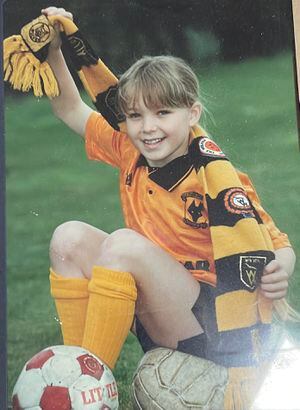
Scouted by Wolves at around the age of 14, it was still very much for fun, albeit she quickly progressed to the reserve ranks and then the first team, then occupying the second tier of the women’s league pyramid.
Training on the grounds of St Edmund’s School now part of Wolves’ Compton Park training ground, and playing games at Willenhall Town which is now Sporting Khalsa, Unitt can clearly recall the lightbulb moment where she first realised football could be something more than just a healthy exercise to occupy her spare time.
“We were in the clubhouse after either a training session or a match and I remember looking up to the TV and the England women’s team were playing in a game against Norway,” she explains.
“Up until that point I had no idea that an England women’s team even existed!
“I love football and enjoyed playing for fun but had just started to take it more seriously during my time at Wolves.
“When I realised there was a senior England team that gave me something to aim for – so yeh, I decided there and then that I wanted to play for England!”
And play for England, Unitt did. On an incredible 102 occasions.
Wolves Women coach at the time Mark Williams put Unitt forward for England Under-18 trials, and eventually she would make 17 appearances at junior level before making her senior debut not long after turning 18.
Needing to ensure she stayed at the top of the women’s game, she had to move on from Wolves, for a club career which took in Everton (twice), Fulham, a spell in America with the New Jersey Wildcats, Birmingham City, Notts County, Solihull Moors and London Bees.
Unitt was at Fulham when they were the only full-time ladies’ team and won the treble of league and both cups in 2002/03.
She also won the FA and League cups on other occasions, was named as England’s International Player of the Year in 2004 and 2006 and was among the first batch of players to be handed central contracts by the FA in 2009.
Speaking to Unitt however, there is certainly not the air of someone with the trappings of having reached the pinnacle of their profession and tasted success both for club and country.
And being part of the squad for three European Championships and two World Cups.
As she freely admits, she is fairly laid back!
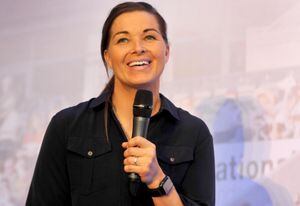
“I always get asked that question, ‘what does it feel like to play for England?’, and I often find it quite difficult to explain,” she reveals.
“Of course I feel proud, it’s a great honour to represent your country, but I am one of those characters who is quite laid back.
“I think it was only when I achieved my 100th cap that I sat back and thought, ‘do you know what? I’ve done alright here’.
“Before that I was just cracking on and would probably say things to put myself down more than anything.
“If people told me how well I was doing I would reply that I’m just lucky that I was left-footed and stuff like that.
“I think that was my way of approaching it and making sure I never got carried away.”
That 100th appearance was obviously a particular career highlight.
Former England manager Hope Powell would always mark a player’s century by making them captain and Unitt not only took the armband, but she also scored in a 6-0 win against Croatia.
Another highlight was playing in her hometown at Walsall FC and netting twice in front of family and friends in a 4-1 win against the Czech Republic.
When football did finally come to an end, Unitt gradually faded away into the distance without any sort of public fanfare or media attention.
She suffered ACL injuries to both knees in quick succession, and, having found herself not enjoying football as much as previously, decided it was time to call it a day.
Coaching was a potential option, she did some work for former Fulham and England team-mate Rachel Yankey’s soccer school in London as well as at schools locally, but it never really struck a chord.
Moving in a different direction, Unitt originally worked at a special needs school, although there was one burning post-football ambition which she has since been able to fulfil.
“I had always wanted to join the Fire Service, right from doing some work experience at Walsall Fire Station at the age of 16,” she explains.
“Obviously with my commitment to football that had to be put on hold, but, when I finished, I applied to become a Firefighter and that is why I joined so late.
“It took me a while to be successful but it’s a great job and, while this may sound a bit strange, very similar to football.
“You work as part of a team - I’m with maybe four or five others on shift - and so you get that same sense of banter that you have in a football changing room.
“And a lot of the skills I developed in football – communication, teamwork, adaptability, resilience – I was able to transfer all of those over which helped make it quite a smooth transition.”
The Staffordshire Fire & Rescue women’s football team wouldn’t have a bad side themselves given Unitt could be joined by another former England international in Assistant Chief Fire Officer Michelle Hickmott, and Derby County’s Sherry McCue, who represented England at junior level.
“We’ve actually got a five-a-side tournament coming up soon so might have a half decent team,” Unitt confirms.
More and more people becoming involved in women’s football is a reflection of the way the game has grown so hugely in recent years.
Unitt believes the catalyst was when England hosted the European Championships back in 2005, with crowds of 80,000 or so watching the games in addition to millions more on television.
That sowed the seeds of just what might be possible, and what has led not only to the game capturing the public imagination but also some of its former stars – Unitt’s ex-teammates - now being very much part of the media fabric of the sport across men’s football as well as women.
“Alex Scott is absolutely flying, isn’t she? Her face is all over the TV which is great profile for the women’s game,” says Unitt.
“A few others too, Fara (Wiliams), Browny (Rachel Brown), Bass (Laura Bassett), Kaz Carney, a lot of them are getting involved which is brilliant.
“I have had a few opportunities to do bits and pieces but I’m not sure it’s for me really – I’ve got a face for radio!
“But I think it shows just how the game is growing, and you can see that even by just looking at the supporters.
“Back in the day it would maybe be young players coming to games with their parents but now it’s like every Tom, Dick and are wanting to go and watch as fans and that’s fantastic.
“That Barcelona/Real Madrid game in the Champions League not so long ago broke the record attendance for a club game with over 91,000.
“I think what’s also important is how standards have risen and with clubs having gone full-time, training every day and being affiliated to men’s clubs and improving their facilities, the quality has got so much better.
“The standard of pitches has helped as well because before you would find yourself playing on a bobbly surface where your first touch was a pass, now the pitches are so much better and really helps when you are wanting to produce good football.”
Progress made within women’s football in general – and producing good football - has certainly been mirrored at Wolves, where Unitt still harbours such fond memories of where it all began.
She still closely follows the fortunes of the team which have enjoyed several successful seasons and shares the frustration that winning the Northern Premier League title didn’t automatically secure promotion back to the second tier occupied back when she was starting out.
Instead, there followed a one-off play-off with Southern Premier League winners Southampton, and a narrow 1-0 defeat, to the disappointment of so many.
“I loved it at Wolves with such great girls and we had a decent team as well, although we were second to Villa in the area at the time,” Unitt recalls.
“I’m still in touch with a lot of the players and a fair few joined me for my 40th birthday celebrations last month.
“I still keep a close eye on Wolves’ results and have been to watch a few times and they were so unlucky this season.
“They did so well and it’s so frustrating that they must be in the only league where if you win you have to go into a play-off instead of getting automatically promoted – it really does need two teams to go up.
“Hopefully that will change, and hopefully if they can make a few signings to strengthen over the summer, Wolves will be right up there or thereabouts again next season.
“They have built up some real momentum over the last few years and it will be nice to see them into the Championship and then eventually, the WSL (Women’s Super League) as well.
“They have got the support of the club which is what you need to do that, and there could definitely be more exciting times ahead.”
Unitt certainly enjoyed exciting times of her own during a lengthy and trophy-laden career, albeit she laughs when told that several players still plying their trade hail her as a role model.
“I thought I was dead meat now,” she chuckles.
Her Wolves legacy is certainly secure as well, as the ever-persuasive Women’s chair Jenny Wilkes commandeered her 100th England cap and runners-up medal from the 2009 Euros to be loaned and on show in the Wolves Museum.
“Everyone needs a role model and it’s important to have someone to look up to and be inspired by,” says Unitt.
“If there were players who were inspired by me when I was in my prime then that’s lovely to hear.
“There is a new generation of players coming through and now in the squad for the Euros, and now they are inspiring girls to want to play football in the future.”
This new squad of players under the guidance of Sarina Wiegman may well go on and go one – or two better – than the semi-finals reached in the last three major tournaments, and no doubt the country will be right behind them if they do.
But it’s always worth remembering the contributions - as the FA do with their Hall of Fame which Unitt was inducted into back in 2016 – of those trailblazers who have come before.
Unitt may be by her own admission laid-back, and extremely modest about her career achievements, but, from starting out all those many years ago with Wolves, she has been one of many Lionesses whose metaphorical roar has helped raise the noise levels for England’s Euro hopefuls of today.

